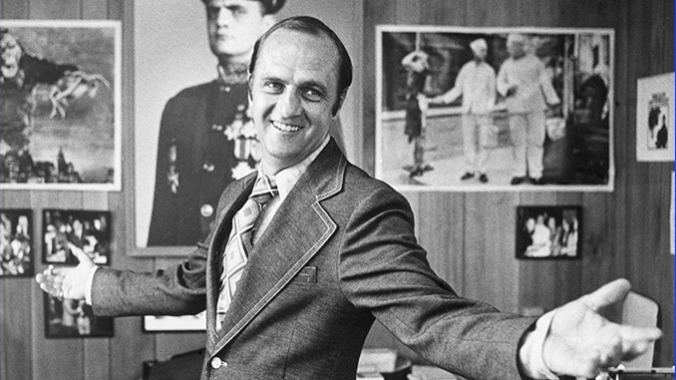Bob Newhart, Stand-up and Sitcom Pioneer, Dies at 94
Credit Getty Images: Bettmann / Contributor
The year was 1961. The Grammys were still in their infancy. The crown jewel of the ceremony? Naturally, the prize for Album of the Year. In the category: Nice ‘n’ Easy, an album by Frank Sinatra, who won the award the previous year, and recordings by Nat King Cole and Harry Belafonte, a pair of singers at the top of their game. Yet the winner was a 32-year-old comic from just outside Chicago, whose album, The Button-Down Mind of Bob Newhart, reached number one on the Billboard charts and influenced an entire generation of comics. And so began one of the great careers in comedy, and indeed in all of show business.
Bob Newhart died on July 18, 2024 at the age of 94, a year after his wife of 60 years, Ginny, and seven years after the man he often referred to as his best friend, Don Rickles. The Newharts and the Rickles often vacationed with one another, as depicted in Judd Apatow’s recent documentary about the pair and their relationship. “Don is my best friend,” Newhart said at the Dean Martin-hosted roast of Rickles in 1974, “which just gives you some idea the difficulty I have in making friends.”
One of the great jokes between the two friends was their vastly different levels of success on television. Whereas Rickles constantly had his programs canceled, Newhart starred in two of the most influential sitcoms of the 1970s and 80s. First was The Bob Newhart Show, in which he played the Chicago psychologist Robert Harley for 142 episodes. “I’m a listener and I react to what people say,” he once said of the show. “We needed a profession that suited that.”
Then came Newhart. From 1982 to 1990, he starred as a writer-turned-innkeeper by the name of Dick Loudon. The series features one of the most memorable show endings in history. Newhart (spoiler warning) goes to bed as his character in Newhart, but wakes up as Harley, in bed with Suzanne Pleshette, who played his wife, Emily, on The Bob Newhart Show. He shares that he has just had a dream about being an innkeeper in Vermont, etc.
This kind of dry, cerebral humor defined Newhart throughout his career. “Bob Newhart taught countless generations of comedians that you could be funny, smart, uncompromising, and still win on your own terms,” Conan O’Brien wrote. Newhart won the Mark Twain Prize for American Humor in 2002.
-

-

-

-

-

-

-

-

-

-

-

-

-

-

-

-

-

-

-

-

-

-

-

-

-

-

-

-

-

-

-

-

-

-

-

-

-

-

-

-








































